The Quaker poet John Greenleaf Whittier (1807-1892) is well-known for his efforts as a writer, editor, legislator, and abolitionist. Countless towns, schools, and natural formations are named for him, including Whittier Glacier in Alaska and, by extension, its tiny neighboring town, a gateway to Prince William Sound that I’ve had the profound pleasure of visiting.
John Greenleaf Whittier was deeply religious, but at the same time he was remarkably reverent towards the environment. His poems rhapsodize about woods, water, and pastoral settings. He was also enamored of birds. Many of his works include references to avifauna, specifically blackbirds and thrushes. As passionate about ending slavery in America as he was about nature, Whittier found birds highly symbolic of freedom and grace. In the following poem, What The Birds Said, his migrating narrators share their bird’s-eye view of the ravages of the Civil War:
What The Birds Said
The birds against the April wind
Flew northward, singing as they flew;
They sang, “The land we leave behind
Has swords for corn-blades, blood for dew.”“O wild-birds, flying from the South,
What saw and heard ye, gazing down?”
“We saw the mortar’s upturned mouth,
The sickened camp, the blazing town!“Beneath the bivouac’s starry lamps,
We saw your march-worn children die;
In shrouds of moss, in cypress swamps,
We saw your dead uncoffined lie.“We heard the starving prisoner’s sighs
And saw, from line and trench, your sons
Follow our flight with home-sick eyes
Beyond the battery’s smoking guns.”“And heard and saw ye only wrong
And pain,” I cried, “O wing-worn flocks?”
“We heard,” they sang, “the freedman’s song,
The crash of Slavery’s broken locks!“We saw from new, uprising States
The treason-nursing mischief spurned,
As, crowding Freedom’s ample gates,
The long-estranged and lost returned.“O’er dusky faces, seamed and old,
And hands horn-hard with unpaid toil,
With hope in every rustling fold,
We saw your star-dropt flag uncoil.“And struggling up through sounds accursed,
A grateful murmur clomb the air;
A whisper scarcely heard at first,
It filled the listening heavens with prayer.“And sweet and far, as from a star,
Replied a voice which shall not cease,
Till, drowning all the noise of war,
It sings the blessed song of peace!”So to me, in a doubtful day
Of chill and slowly greening spring,
Low stooping from the cloudy gray,
The wild-birds sang or seemed to sing.They vanished in the misty air,
The song went with them in their flight;
But lo! they left the sunset fair,
And in the evening there was light.
Whittier is included in that gang of 19th-century New England versifiers known as the Fireside Poets. This celebrated group included other authors of poems that celebrate nature including luminaries like William Cullen Bryant and James Russell Lowell.
If you liked this poem and would like to browse the entire archive of poetry posts on 10,000 Birds please check out our Bird Poems page.

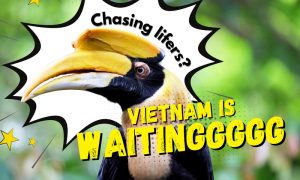


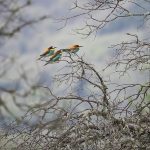
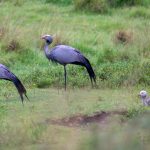
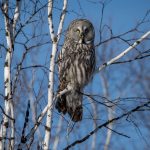


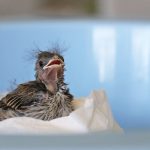
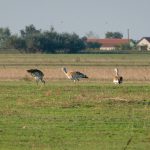
I live in Whittier, Alaska and I never had read anything by John Greenleaf Whittier. It was just a name, before. Thanks for sharing that!
Just discovered your site. Have you ever been to Whittier, Alaska? You’d love it! We operate wildlife & glacier tours. For birds we see black legged kittiwakes, pigeon guillemot, bald eagles, marbled murrelets & kittletz’s murrlets and others.
Hi Marie. As a matter of fact, I have visited Whittier and loved the glacier cruise on Prince William Sound. My favorite part was traveling through the tunnel to get to the town!
Why contrast a love of nature with being religious? They are not necessarily diametric.